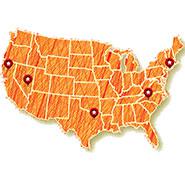Map It Out: The Best States To Start A Solution Provider Business

The tax has the state's solution provider community up in arms, with some reportedly having second thoughts about plans to move into or expand their operations in Massachusetts. "If this tax had passed on Jan. 1, I would have strongly considered moving 20 minutes over the border to Rhode Island," said Allen Falcon, CEO of cloud solution provider Cumulus Global, who earlier this year expanded his business in Westborough, Mass.
The controversy over the new tax puts a spotlight on the question of which states are the most attractive—–and which states are not—-for entrepreneurs to start a solution provider business and for existing solution providers to expand their company.
[Related: What Do You Need To Know About The Massachusetts Software Services Tax? ]
Taxes, of course, are just one of many criteria entrepreneurs consider when deciding where to start or expand a business. A state's labor costs, regulations, available pool of educated workers, cost of living, telecommunications infrastructure, and track record for innovation and opportunity all come into play.
CRN researchers and editors have undertaken a detailed analysis of the business climate in all 50 states to offer readers some guidance about what makes some states better than others when it comes to starting and growing a solution provider business.
The analysis covers a broad range of criteria including a state's labor and energy costs, taxes (including tax incentives, corporate income taxes and property taxes), workforce education levels and availability of IT workers, regulatory environment, level of innovation (as measured by exports and awarded patents), business opportunity and economic strength rankings, and even lifestyle criteria such as crime rates. In a detailed story, a series of online slide shows and an interactive map, running exclusively on CRN's iPad and Windows 8 tablet app in September, CRN will examine how each state stacks up and rank them overall and according to specific criteria. Which state ranks No. 1 in workforce education and experience? Which state has the biggest tax and regulatory burden? And how do traditional IT hotbed states like California fare in the rankings?
CRN also is examining how some of its annual rankings jibe with the state-by-state analysis. Are solution providers on the annual CRN Solution Provider 500 list clustered in certain states? How about the Next-Gen 250? Or the Fast Growth 100? The analysis follows a survey of 250 solution providers in February undertaken to determine the importance solution providers place on each of the criteria.
The CRN Tech News app can be downloaded for free at the iTunes and Windows app stores.